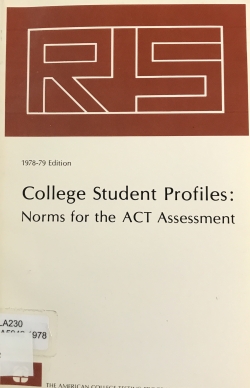Vanderbilt issues in higher education Academic Disciplines: Holland's Theory and the Study of College Students and Faculty (Vanderbilt Issues in Higher Education)

Buy online ($)
Type
Book
ISBN 10
0826513050
ISBN 13
9780826513052
Category
Unknown
[ Browse Items ]
Publication Year
2000
Publisher
Pages
304
Subject
Holland, John L. Education, Higher--Social aspects. Universities and colleges--Sociological aspects. College teachers. College students.
Series Name
Abstract
Using as a framework the "theory of careers" developed by John L. Holland, the authors of this volume examine the patterns of student stability and change inherent in the college experience, as well as the variations in professional attitudes and behaviors of college faculty. Their goal is to learn more about what colleges and universities might do to facilitate the retention, satisfaction, and learning of their students. For example, why should faculties split over student-oriented teaching strategies, one group favoring the formal, structured classroom, the other a freer, more spontaneous environment? Why do some undergraduates become independent thinkers with strong analytical, mathematical, and scientific competencies while others develop powerful interpersonal and group leadership skills? Holland's theory--at its core a person-environment fit theory--assumes that there are six personality types and six analogous academic environments and that the educational persistence, satisfaction, and achievement of students are a function of the congruence or "fit" between students and their academic environments. The authors also assume that there are circumstances under which the environments of the major field exert more influence on students than do the students' own personality traits. Applying Holland's theory to distinctive clusters of academic disciplines, the authors have found that the answers to such fundamental questions as those asked above emanate from a basic understanding of the influences of academic disciplines and the manner by which they shape the patterns of thought and behavior of both college students and faculty.
Description
Academic disciplines and academic lives -- Holland's theory and its assumptions -- Research design and sample -- Academic environments and faculty -- Students' self-selection into academic environments -- Socialization effects of academic environments -- Person-environment congruence and college student outcomes -- Extension and overview : the importance of academic environments -- Educational and organizational implications of Holland's theory in higher education settings.
Biblio Notes
Includes bibliographical references (p. 262-273) and index.
Number of Copies
1
| Library | Accession No | Call No | Copy No | Edition | Location | Availability |
|---|---|---|---|---|---|---|
| Main | 637 | LA184 .S42 2000 | 1 | Yes |




